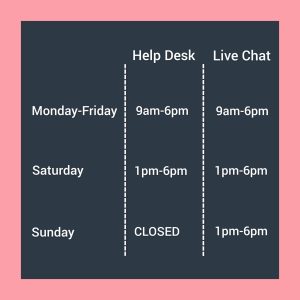
From 1st April the library Help Desk and Live Chat hours are changing.
The service hours will be:
Monday-Friday : Help-desk 9am-6pm ; Live Chat 9am-6pm.
Saturdays: Help-desk 1pm-6pm ; Live Chat 1pm-6pm.
Sunday: Help-desk CLOSED ; Live Chat 1pm-6pm.

From 1st April the library Help Desk and Live Chat hours are changing.
The service hours will be:
Monday-Friday : Help-desk 9am-6pm ; Live Chat 9am-6pm.
Saturdays: Help-desk 1pm-6pm ; Live Chat 1pm-6pm.
Sunday: Help-desk CLOSED ; Live Chat 1pm-6pm.
In September 2022, Hong Luo started working with us as part of the Positive Action Graduate Traineeship, which seeks to address the underrepresentation of people from Black, Asian and Minority Ethnic backgrounds working in Higher Education Libraries. The traineeship offers a recent graduate the opportunity to work for 12 months as a Library Assistant, gaining experience which may hopefully lead to a career in libraries.
Hong describes her experiences of the traineeship so far in the words and illustrations below.
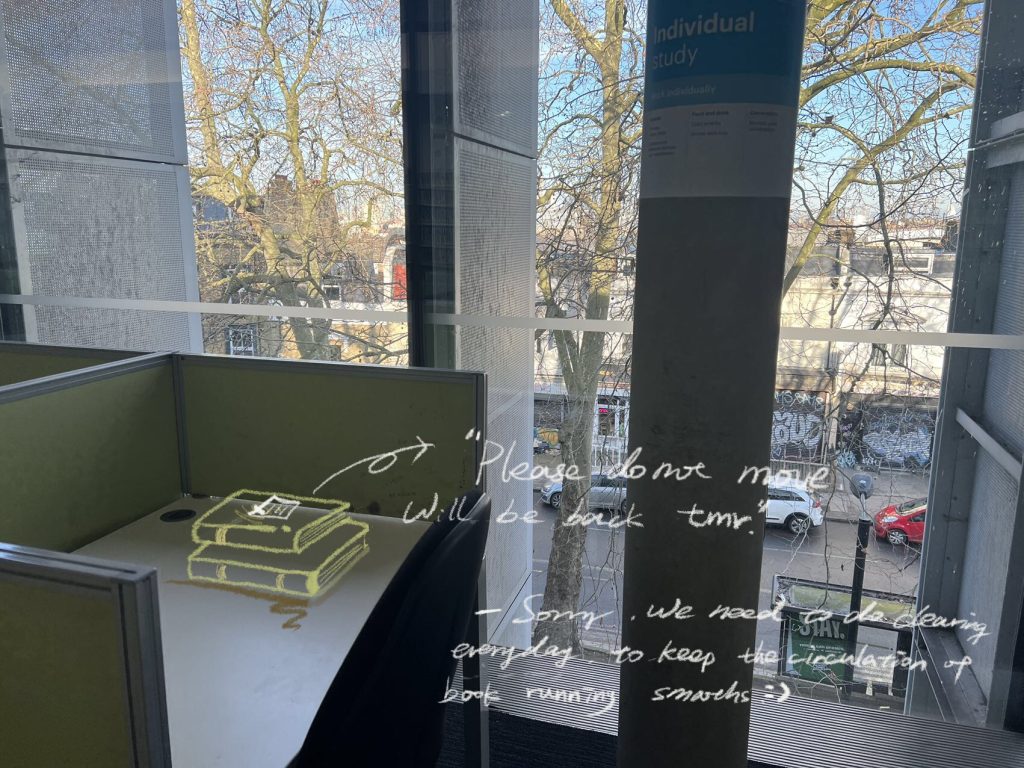
“ You never know what waits for you, until you take action ”
” 知之之要,未若行之之实 “
I used to resist this sentence, which has been told so many times by friends and tutors, as I always want to make a perfect plan before taking action. But gradually I am understanding what that sentence means.
As a Fine Art student at Goldsmiths, standing in front of the Library Help Desk, I never knew the offices behind this desk were home to a group of warm, meticulous and professional library staff. The library job is never only about lending a book or finding a study space. There are so many things you can explore or utilise in the library, including study skills workshops, the zines collection and monthly book displays.
I am principally based in the Reader Service team within the library. Day-to-day tasks for this team include shelving, searching for lost and missing items, mending books, processing membership applications as well as answering varied enquiries at the library help desk. There are so many things to do in the library and I never feel bored.
The library job never finishes, as I was told by in my first week by my colleague Judith (a lovely lady who has worked in the library setting for a long time). The first development I noticed was that I slowed down my pace, becoming calmer, starting my day with the basic things and focusing on the details.
What attracts me most to the traineeship is that, though this position is based in the Reader Services team, I also get the opportunity to work with different library teams, throughout the year. This is an excellent opportunity for me to learn, explore how an academic library operates as a big system, understand what is unique about Goldsmiths Library and how I can help to make it a little better.
During autumn term I worked with the Digital Assets team, dealing with inter-library loan (ILL) requests and scanning for reading lists. Processing an ILL request is a bit like detective work and it can get complicated if the book is old or in another language. But for me, that’s also the most fun part. I’m often amazed by everyone’s reading lists, how unique each person’s interests are, and how many things there are in this world just waiting to be explored.
Inevitably, as a beginner here I’ve made mistakes, but this is also the way to learn. I appreciate my kind and experienced colleagues, I feel supported by our teams and have learned a lot from them little by little. Also, learn and find inspiration from our visitors, even through a few sentences, I can tell how unique they are and always come with different views on the same thing.
Apart from the daily tasks, what also surprises me about the library is that there are subtle changes every day.
About the people, who come and go to the library every day whether it’s a familiar face or a new one. And about the space, an orange appeared on a bookshelf and mysteriously disappears a few days later, a three-legged fox (we think, they were fast!) runs past the library back door, a bunch of books often appears on the same desk in the early morning, even though I just put them back on the shelf yesterday.
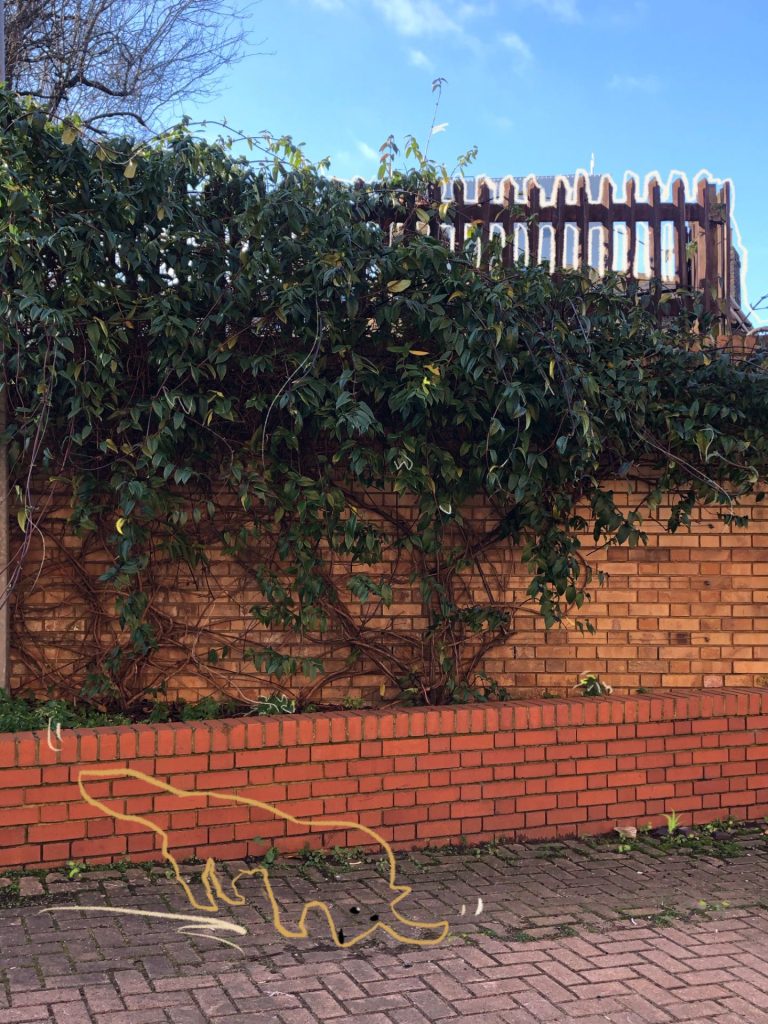
” Every day is a new day “
” 日日常新 ”
I used to resist this sentence too. However, switching to a new perspective by starting this job, I realise how huge the positive power is within that sentence. I look forward to finding a bit of change each day, learning from my daily work and people who come from various backgrounds, and exploring every little thing around the Goldsmiths Library.
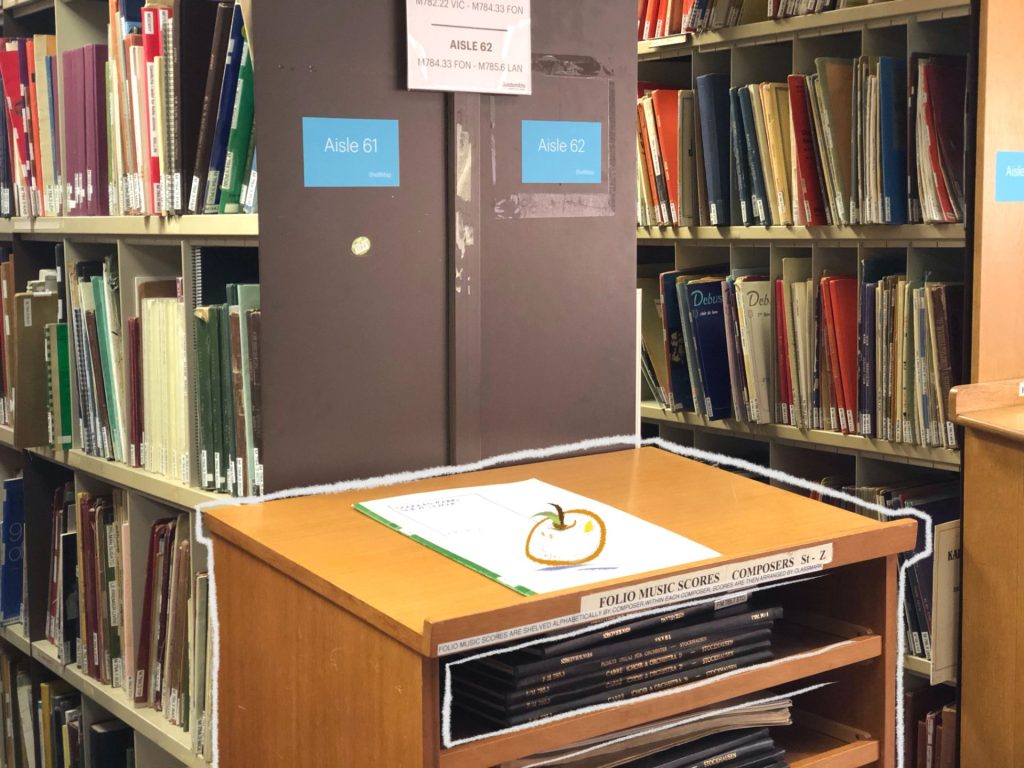
Hong Luo, Positive Action Graduate Trainee
Hello all, I hope you are doing well!
The Library team is working on a research project over the next few weeks to improve Library Search. The Library Search is Goldsmiths’ information database that helps you find hardcopy and electronic resources like articles, books, and journals. The Search is therefore an important aspect of the university, as it supports academics in providing and sharing resources for their modules, as well as enabling students to find those resources. The Library Team wanted to ensure that the Library Search tool is easy and convenient to use, as well as inclusive and accessible. So, we created a research survey to find out more about your experience, and any feedback you may have.
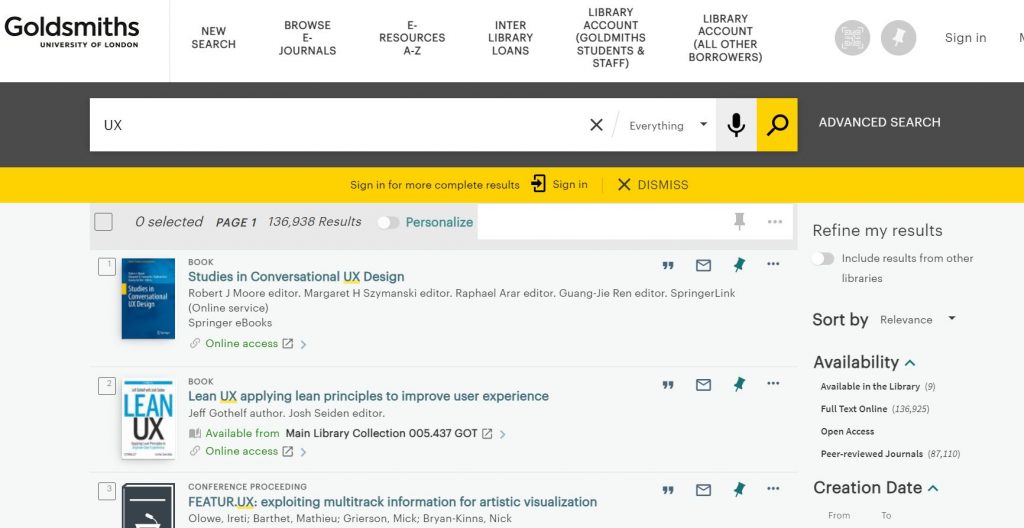
The survey will start by asking about your general experience with the Library Search, including the specific resources you use to find information. We will then go on to ask you about any issues you may have with locating both physical and electronic resources. Your feedback will be asked about specific features of the Library Search – particularly the bookmark function, the filter for Special Collections and Archives, as well as the Library Induction. Finally, if you have any problems with the digital accessibility and inclusivity of the Library Search, this survey will ask you to mention these areas, as well as suggest further improvements.
The survey should take around 20 minutes to complete, and it closes on 3rd July. Your opinion truly matters, so come and help us improve our Library by clicking on this survey link.
Thank you, and have a lovely summer!
Sarah Rex-Lawson
Library User Experience Research Project Team Member
Over the summer, the Online Research Collections team in the Library, along with our cataloguing colleagues Diana Stevenson and Joanna Martin have been working on a project to make all Goldsmiths theses from 2020 to July 2021 available on our institutional repository Goldsmiths Research Online (GRO). Providing access to our theses from the last two years has been delayed due to a variety of factors relating to COVID-19 so it is great to finally make them available.
The PhD theses we hold are a unique record of the academic, intellectual and research culture at Goldsmiths from the 1960s onwards. Our thesis collection is one of our most heavily used digital collections, so now that our most recent theses are accessible online, we thought it would be a good time to provide an overview of our collection and highlight its richness and diversity.
PhD research at Goldsmiths
In the 1960s and 1970s Goldsmiths rapidly expanded its portfolio of courses and started to offer postgraduate studies and research opportunities across the arts and humanities.
The earliest doctorate thesis that we hold is Marie Cecilia Wragg’s The development of emotional and social maturity in boys and girls in certain grammar, comprehensive and modern schools awarded in 1964. Dr Wragg was an educational psychologist and teacher who worked extensively in England and around the world. During her PhD research Dr Wragg clearly made much use of the Library, noting the help of ‘the assistant librarians at Goldsmiths’ College’ in her acknowledgements. While completing her PhD in the 1960s, she worked at Goldsmiths as a senior lecturer in the Education department and as a Hall of Residence Head. Following the completion of her PhD, Dr Wragg travelled widely in India, writing a number of journal articles about her investigations into educational psychology, teacher training and higher education in the country.
It was only in the 1980s that a large volume of theses started to be produced at Goldsmiths, with the Library holding 114 theses from the decade. In the 1990s, 138 theses were produced and in the 2000s the number had risen to 486, with numbers now averaging around 100 theses per year.
Our theses collection
The Library holds over 1,500 bound copies of theses. Our full collection of hard bound theses is available on Library Search. In normal circumstances, all bound theses on the catalogue can be consulted in the Library but due to COVID-19 restrictions this service is currently suspended.
The requirement to submit both an electronic and bound copy of a thesis has been in place at Goldsmiths since 2010, with our electronic thesis collection held on our institutional repository Goldsmiths Research Online (GRO). In addition to that, we have retrospectively digitised theses from earlier years, as a part of the British Library’s EThOS service . Due to COVID-19 adjustments, PhD candidates in 2020-21 have been asked to submit their final thesis in digital format only.
In total, there are over 1,300 theses available in GRO (these are also accessible through Library Search). To browse our full digital collection on GRO just go to the browse menu and select ‘Item Type’ followed by ‘Thesis’. A range of FAQs on accessing digital theses on GRO is available here.
Moving from a collection of hard bound theses held in our store, to a digital collection accessible to anyone in the world with an internet connection has increased the visibility of our thesis collection and reduced barriers to accessing these valuable and unique resources. Providing free, online access also benefits our authors by increasing the reach of their work and the potential that it will be cited, as well as helping to promote their research during the early stages of their academic career.
Highlights from the collection
Our earliest electronic thesis dates back to 1982. Some of our earliest electronic theses from the 1980s include work produced by researchers still associated with Goldsmiths including Alan Pickering, Sophie Day, and Heidi Safia Mirza , who wrote a short account of her experiences completing a PhD as a single mother in the 1980s which is well worth a read.
Our repository collection covers a huge range of areas and includes creative writing and practice research theses. The collection includes work by a number of former and current Library colleagues, along with theses by notable alumni such as the art historian and broadcaster David Dibosa , the Booker Prize winning author Bernardine Evaristo, the 2021 Turner Prize nominee Daniel Fernandes Pascual , and the joint winner of the Turner Prize in 2019 Lawrence Abu Hamdan.
Theses are amongst the most downloaded items in GRO. Over the past year our most downloaded thesis Valerie Welbanks’ Foundations of Modern Cello Technique; Creating the Basis for a Pedagogical Method has been accessed over 3,320 times. Our next most downloaded thesis, Rosa Crepax’s The Aesthetics of Mainstream Androgyny: A Feminist Analysis of a Fashion Trend has 1,470 downloads, followed by Jennifer May Brand’s From Design to Decline: Boosey & Hawkes and Clarinet Manufacturing in Britain, 1879-1986 with 1,268 downloads.
Our list of the most downloaded theses of all time gives a sense of the diverse range of postgraduate research taking place ate Goldsmiths and emphasises the value to authors of making their thesis open access.
| Author | Title | Downloads |
| Sandra Gaudenzi | The Living Documentary: from representing reality to co-creating reality in digital interactive documentary | 16,432 |
| Andrew Sockanathan | Digital Desire and Recorded Music: OiNK, Mnemotechnics and the Private BitTorrent Architecture | 13,172 |
| Christopher Brauer | Netmodern: Interventions in Digital Sociology | 12,852 |
| Jacqueline Cooke | Art ephemera, aka “Ephemeral traces of ‘alternative space’: the documentation of art events in London 1995-2005, in an art library” | 11,351 |
| Fiona Anne Seaton | ’They Opened Up a Whole New World’: Feminine Modernity and the Feminine Imagination in Women’s Magazines, 1919-1939 | 11,335 |
Statistics collected 16 August 2021
Further help and resources
If you wish to explore theses produced outside Goldsmiths, our Open Access Libguide includes links to a range of resources that will help you access theses produced in other UK universities and beyond.
As well as providing access to our PhD collection Library Search also includes many theses from other UK universities that are available through the British Library EThOS service.
For further guidance or questions about accessing our thesis collection, please get in touch with the Online Research Collections team at gro@gold.ac.uk
Pieter Sonke, Online Research Collections team
I’ve been working in my role as Acquisitions Assistant, at Goldsmiths Library, for 2 years now. Prior to starting this role, I assumed I had a reasonable understanding of what eBooks are, and how they compare to print books and other online resources offered by an academic library.
I soon realised that eBook publishing is complex and getting the most out of the hosting websites’ features, or identifying licensing restrictions, is not always straightforward. I’ve written this blog post and an eBook License Guide to highlight some of the things I’ve discovered.
The role of the eBook has never been as fundamental, to the support of learning and research, as it has been during the pandemic. Though it would be unfair to expect online resources to resolve all the issues that arose from library closures, and limited access to physical collections, there have been significant problems with eBook provision, that ought to be rectified.
One critical issue is the cost of eBooks, which has been well documented over the past year. If you haven’t already, please read and sign the open letter asking the UK Government to investigate the practices of the academic eBook publishing industry. Some publishers have chosen to increase eBook prices during the pandemic, or only offer key texts to libraries as part of expensive subscription packages.
It is clear that most academic libraries prefer to purchase permanent (aka perpetual) licenses for specific eBooks, rather than paying for packages, which may have a few key texts bundled in with less popular or relevant titles. Another inescapable problem is that many titles, particularly those published before the 21st century, have never been available as eBooks, and certain subject areas, such as art and design, offer limited availability for recent publications.
There is still a tremendous amount of content out there, and it is always worth checking the selection of open access eBooks, available free of charge, including the UCL Press collection. Goldsmiths’ students and staff also have access to eBooks via Senate House Library.
The Goldsmiths Library catalogue acts as a gateway to the available eBook collections, but the websites that host eBook content vary greatly in terms of layout, functionality and access restrictions. Some eBooks are laid out like print books, while others are viewed online as a continuous body of text.
You may have more experience of reading eBooks on an eReader, but academic eBooks are not always compatible with these devices. It may be necessary to download specific software and even then access to full eBook downloads are often time limited. More information on using the websites of the library’s main eBook providers, Proquest Ebook Central and VLeBooks can be found on the eBooks Libguide.
The eBooks available via these 2 providers, alongside EBSCO eBooks, will typically have some Digital Rights Management (DRM) restrictions, that may limit the number of users that can access a book at the same time, limit the loan length of a full download, or the percentage of the book that can be printed or copied.
Other websites, particularly those hosting content from university press publishers, offer fewer restrictions, and it is often possible to download the full eBook, in PDF format, to keep permanently. An excellent example of this is the Duke University Press collection, for which Goldsmiths Library offers access to all titles.
For reading list materials, it is always worth planning ahead as some eBooks, like their print siblings, will have limited availability at the times when they are most needed by other students on your course. Digitised versions of essential chapters may be available to download via the module’s online reading list. If your reading list specifies a chapter or section to read, it is also advisable to check if that part of the eBook can be downloaded, as a PDF, using the copy or print features on the hosting website.
For guidance on identifying the type of eBook license the library provides, and the restrictions of use, an eBook License Guide is now available on the library webpages. It can be a confusing and at times frustrating topic, so if you have any questions, or specific accessibility requirements, please get in touch with the library for additional support.
Nick Leigh
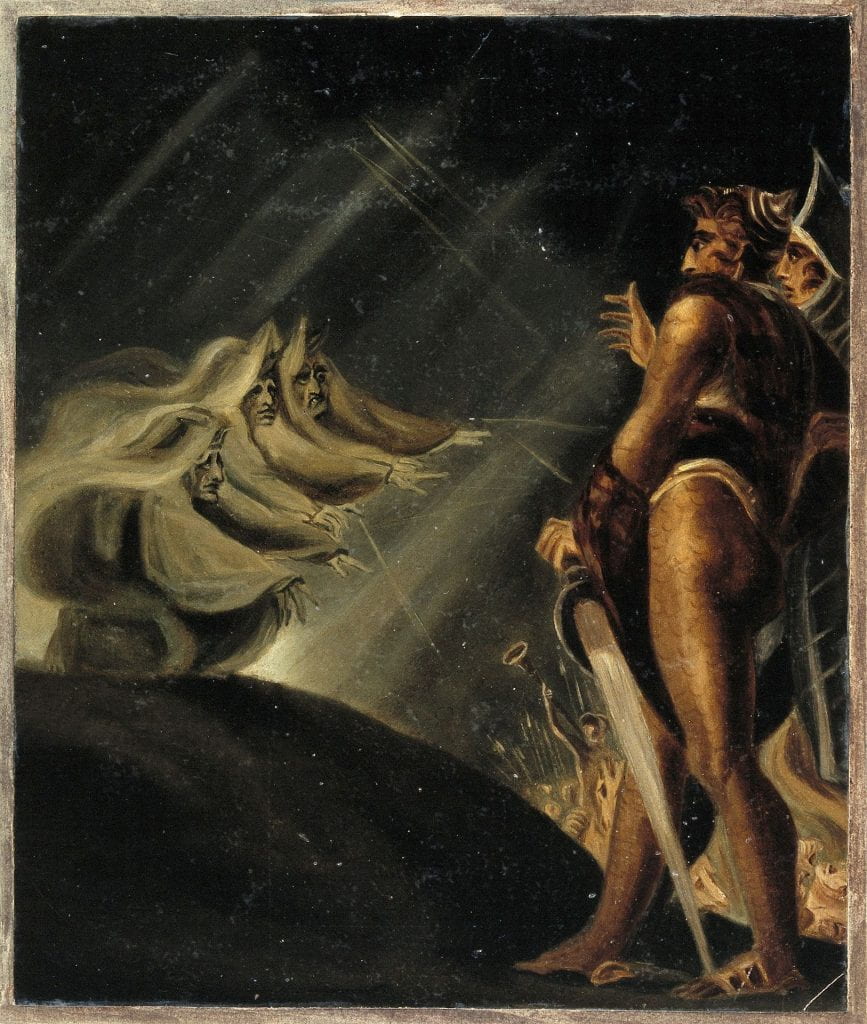
Macbeth and Banquo meet the three witches on a heath; scene from Shakespeare’s ‘Macbeth’. Painting after J.H. Füssli (Fuseli).. Credit: Wellcome Collection. Attribution 4.0 International (CC BY 4.0)
The Library subscribes to a number of databases and websites which include Shakespeare resources, such as filmed performances of productions and other related material.
Goldsmiths E-resources
Artfilms is a video streaming service offering more than 5000 films from around the world for arts education and arts practitioners. Includes Shakespeare and other performances.
BoB is Learning on Screen’s on demand service for education, with TV and radio programmes from over 65 Freeview channels.
A performing arts resource featuring over 400 British theatre productions onscreen. Includes BBC, Globe and RSC Shakespeare productions, plus Manga Shakespeare graphic novels.
1500 play scripts in the core collection, plus Globe on Screen performances.
Literature Online includes Shakespeare criticism and Cambridge Companions to Shakespeare.
Routledge Performance Archive provides a range of streamed video and audio footage from performance practitioners past and present, paired with relevant critical commentary.
Arkangel Shakespeare audio versions of 38 plays, part of Literature Online (LION).
A yearbook of Shakespeare studies and criticism going back to 1948.
Theatre in Video contains hundreds of documentaries and performances of plays, including 160 Shakespeare related videos.
A Selection of Websites
The Complete Works of William Shakespeare (play texts) : http://shakespeare.mit.edu/
Globe Player : https://globeplayer.tv/free-content
National Theatre At Home : https://www.nationaltheatre.org.uk/nt-at-home
Royal Shakespeare Company : https://www.rsc.org.uk/
Shakespeare’s Globe : https://www.shakespearesglobe.com/
Shakespeare Online : http://www.shakespeare-online.com/
All Goldsmiths databases require institutional login for access. For further information and resources please see the Library’s Audio-Visual and Theatre Subject Guides.
Mark Preston, Subject Librarian for Education, English & Theatre
The Library subscribes to a number of audio-visual databases which include filmed performances of Theatre productions and other Theatre-related material. Please feel free to have a look at the following:
ArtFilms :
https://www-artfilms-digital-com.gold.idm.oclc.org/
Artfilms-Digital is a video streaming service offering more than 5000 films from around the world for arts education and arts practitioners. Includes Shakespeare and other performances.
Box of Broadcasts :
https://learningonscreen.ac.uk/ondemand
BoB is Learning on Screen’s on demand service for education, with TV and radio programmes from over 65 Freeview channels.
Digital Theatre Plus :
https://www.digitaltheatreplus.com/user
An integrated online performing arts resource featuring recent British theatre productions onscreen, study guides and teaching materials. Includes over 400 filmed productions.
Drama Online :
https://www-dramaonlinelibrary-com.gold.idm.oclc.org/
1500 play scripts plus Globe on Screen performances. Temporarily extended until 31st May to include 3000 plays and all audio-visual content, including BBC, National Theatre and RSC productions.
Film Platform :
https://www-filmplatform-net.gold.idm.oclc.org/universities/goldsmiths-college-library/
This collection is curated by film experts and academics to showcase meaningful documentaries of social, political and cultural importance by some of the world’s top international filmmakers.
Routledge Performance Archive :
https://www-routledgeperformancearchive-com.gold.idm.oclc.org/
Routledge Performance Archive provides exclusive access to a range of streamed video and audio footage from performance practitioners past and present, paired with relevant critical commentary.
Theatre in Video :
https://video-alexanderstreet-com.gold.idm.oclc.org/channel/theatre-in-video
Theatre in Video: Volume I contains hundreds of videos, including documentaries and definitive performances of the world’s most important plays, and covers a wide range of 20th century theatre history.
All items require institutional login for access. For further information and resources please see the Library’s Audio-Visual and Theatre Subject Guides.
Written by Mark Preston, Subject Librarian for Education, English & Theatre
On Monday 23 March the Library building closed until further notice. However, the Library continues to be committed to supporting research, learning, and teaching at Goldsmiths. We are continuing to provide a service through:
Further information on our service is available on our Web pages through the specially developed Library Services and Academic Skills Support During COVID-19 LibGuide
During this time, Library staff will continue to provide support to our students, staff and researchers. We will also continue to develop and manage our collections. Over the coming weeks Library staff will share their experiences of supporting users and developing collections in our Library Blog.
In March, the Online Research Collections teams and one of our Library Student Reps Marco Pace wrote a blog on Open Access at Goldsmiths. Due to the world turning upside down we had to postpone posting the blog but we are now belatedly making it available.
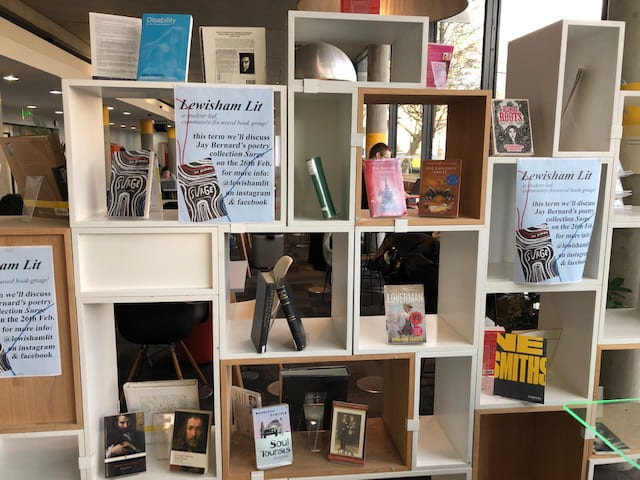
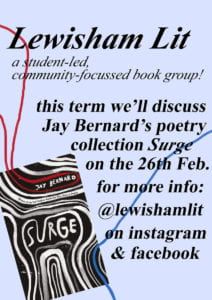 The Library curates regular book displays marking themes and events taking place at Goldsmiths. This month the Library has a foyer book display of writers being studied by a new Student Union society, the Lewisham Lit Society, to highlight the literary history of Lewisham and its vibrant contemporary writing scene. Lewisham Lit Society is a student-led, community focused book group which looks at books written by authors with a connection to the borough or which are set in Lewisham. This year they will be reading Candice Carty Willliams’ ‘Queenie’ (Carty Williams grew up in Lewisham) and Jay Barnard’s poetry collection ‘Surge’, which takes inspiration from the New Cross fire of 1981.
The Library curates regular book displays marking themes and events taking place at Goldsmiths. This month the Library has a foyer book display of writers being studied by a new Student Union society, the Lewisham Lit Society, to highlight the literary history of Lewisham and its vibrant contemporary writing scene. Lewisham Lit Society is a student-led, community focused book group which looks at books written by authors with a connection to the borough or which are set in Lewisham. This year they will be reading Candice Carty Willliams’ ‘Queenie’ (Carty Williams grew up in Lewisham) and Jay Barnard’s poetry collection ‘Surge’, which takes inspiration from the New Cross fire of 1981.
Membership is open to all students at Goldsmiths but also to the local community, and anyone interested in the Society is welcome to contact them at @lewishamlit on Facebook or Instagram.
written by Mark Preston, Subject Librarian
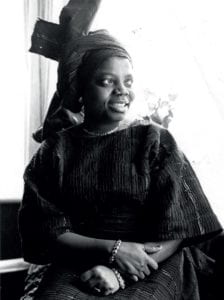
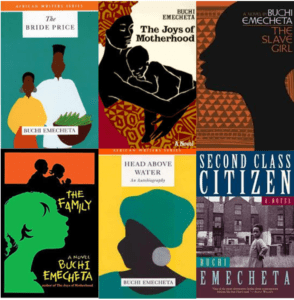
On October 23, the Library celebrated the opening of the Buchi Emecheta Space, a dedicated exhibition area on the second floor. An evening reception featured short talks by the Warden, Professor Frances Corner and Head of Library Services, Leo Appleton. They welcomed the eminent editor, writer and broadcaster Margaret Busby, OBE who shared her experience of being the first to publish Buchi Emecheta’s work in Britain, holding up her copy of the first edition of The Slave Girl, featuring the photographic portrait of the author by Val Wilmer. Angelique Golding concluded the presentations with a beautiful reading from Emecheta’s Joys of Motherhood that brought the power of her writing and her voice into the room.
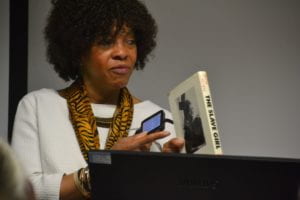
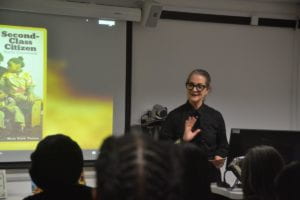
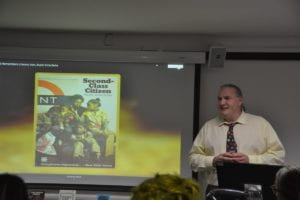
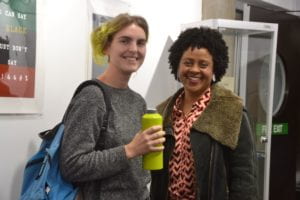
Margaret Busby – Co-Founder, Allison & Busby, Professor Frances Corner – Warden, Goldsmiths, University of London, Leo Appleton – Director of Library Services, Goldsmiths, University of London, Jessa Mockridge – Artist & Writer, Angelique Golding – Department Business Manager, Goldsmiths University of London & student of Black British Writing.
Florence Onyebuchi “Buchi” Emecheta OBE (21 July 1944–25 January 2017) was a powerful and defiant Nigerian British writer, teacher, mother, librarian and ‘African feminist’. She wrote prolifically authoring over 20 books, including: Second Class Citizen (1974), The Bride Price (1976), The Slave Girl (1977) and The Joys of Motherhood (1979). Emecheta’s writing defies easy categorization and is relevant to many communities: Womanists read her fierce motherhood and solidarity; Feminists, her bold independence. Queer readers pick up on her community building. Anti-racist activists celebrate her great pride in her culture and blackness. She is held up as a writer of both Nigerian and Black British identity and continues to inspire contemporary postcolonial writers. Bravery, outspokenness and determination shoot through her novels, plays, autobiography, children’s literature and critical writing.
The Buchi Emecheta Space sees the under-used lobby on the Library’s 2nd floor re-fitted to provide an additional display area in Rutherford Building to show projects developed from engagement with materials held in the Library, including Special Collections and Archives. The inaugural exhibition organized by the curatorial group Present Futures (a collaboration between curators Teal Baskerville, Kathy Cho and Loren Elhili) originated as a project drawing on the Women of Colour Index in the Women’s Art Library collection held in Special Collections. The show, titled ‘Becoming an archive’ is part of an ongoing project presenting the archive as a space of becoming for women and non-binary people of colour and features a wide range of practices, represented by documents, artist multiples, publications and videos. The exhibition also features a powerful new commission from Rebecca Bellantoni who held a flagmaking workshop during Black History Month.
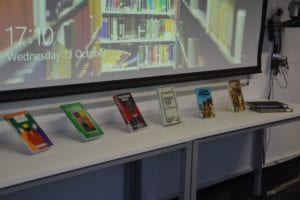
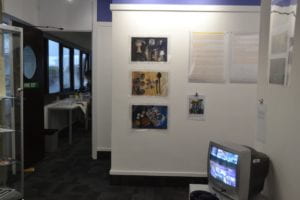
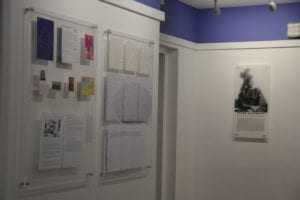
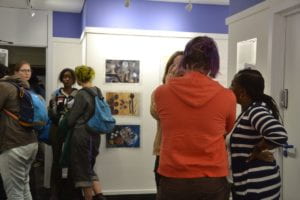
A plaque commemorating Buchi Emecheta is installed in the space alongside a dedication from Chimamanda Ngozi Adichie – ‘Buchi Emecheta. We are able to speak because you first spoke. Thank you for your courage. Thank you for your art. Nodu na ndokwa.’ Jessa Mockridge initiated the project to honor Emecheta with an exhibition she co-organized with Halima Haruna, titled “comeback mother : Buchi Emecheta” (April 2018, Kingsway Corridor, Richard Hoggart Building). This exhibition was an installation inspired by visiting Buchi Emecheta’s archive, preserved by her son, Sylvester Onwordi in London. Jessa worked directly with Sylvester and coordinated colleagues Laura Elliot, Althea Greenan and Nadine Plummer (Black British Writing MA) to visit the archives of manuscripts and ephemera, borrowing a selection for study back in Goldsmiths Special Collections. The exhibition included texts selected by Anqelique and Nadine. Jessa and Halima designed the publication “comeback mother” with reproduced handwritten and type writer notes lifted directly from Buchi Emecheta’s archive. Copies were distributed at the Buchi Emecheta Space opening event and spare copies are available from Special Collections and Archives, should you like one.
The evening featured a display of Emecheta’s books that are held in the Library and a soundtrack of Nigerian popular music. The evening brought together past and current students from the MA Black British Writing course to commemorate one of the most important black women writers published in the UK alongside one of the most important black women publishers, Margaret Busby, on Elizabeth William’s invitation.
The journalist Olatoun Gabi-Williams attended and has since written an excellent article for the Borders Literature web site which was also recently published in the Guardian Nigeria.
http://bordersliteratureonline.net/womendetails/Buchi_Emecheta
https://guardian.ng/art/when-goldsmiths-college-honoured-buchi-emecheta/
The Buchi Emecheta Space is open to students and staff wishing to work with materials from the Library or Special Collections, especially critical projects that broaden the curriculum and maintain the spirit of Emecheta’s appeal to many communities. Email Andrew Gray, Academic Services Librarian a.gray@gold.ac.uk for an exhibition proposal form.